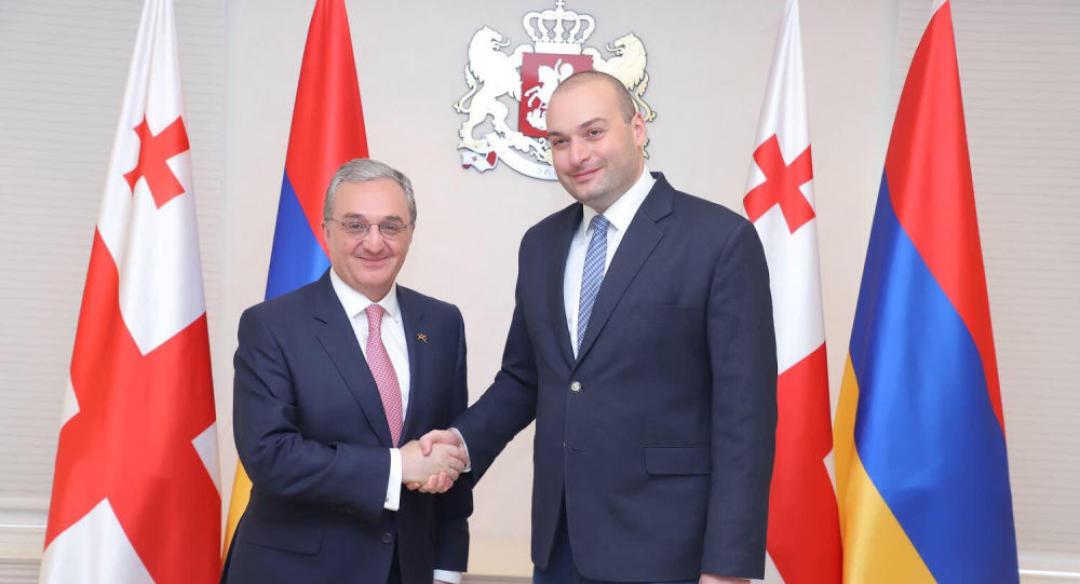
Mnatsakanyan visited Georgia to discuss regional security issues

On 24-25 July the Minister of Foreign Affairs of Armenia Zohrab Mnatsakanyan made his first official visit to neighbouring Georgia. He met with his Georgian counterpart Davit Zalkaliani, the Prime Minister Mamuka Bakhtadze and the Parliamentary Speaker Archil Talakvadze.
During his meeting with Zalkaliani, the parties discussed regional security issues. “Unfortunately, there are still unresolved conflicts in the region. We reaffirmed our commitment to the exclusively peaceful resolution of the conflicts and our intention to support the processes of peaceful settlement within the established scope and through negotiations,” said Mantsakanyan at the press conference afterwards.
A wide range of topics were covered at the meeting with Bakhtadze. The interlocutors stressed the high level of Armenian-Georgian trade and economic relations, and noted that, for the dynamic development of these ties, it is indispensable to make joint efforts to use the existing huge potential, including through the promotion of new regional programs. Mnatsakanyan and Bakhtadze positively assessed the productive cooperation between Armenia and Georgia within international organizations and at some other multilateral platforms. And in the context of the 10th anniversary of the EU Eastern Partnership, they exchanged views on the future vision of this initiative and the steps to expand cooperation within this format. They also lauded the Georgian-Armenian communities’ bridging role in the further rapprochement and strengthening of relations between the two friendly nations.
Of great importance was the discussion on finding an alternate route to Upper Lars (Georgian military way) which connects Georgia with Russia. “The negotiations over finding an alternative way to Upper Lars are entering a new phase. How it will proceed and what progress may be registered is not known yet, but speaking with our partners I may only express the hope that such a situation will occur” said Mnatsakanyan.
Mnatsakanyan also visited the Armenian community in Georgia. He assured that even though Georgia and Armenia have different problems and different foreign policy priorities, they stand united with the common goal of the regional security agenda. “Our common goal is to ensure a safe environment for the welfare of our respective countries through cooperation. The volume of our cooperation is truly rather large in the spheres of energy security, transport infrastructures, economic cooperation, science and culture. Encouraging platforms where the society and NGOs will be in contact is of rather great significance for us,” he stressed.
Armenia and Georgia have complex relations with each other characterised by a certain asymmetry and differing priorities. For Armenia, Georgia is seen primarily as a transit country linking it with the world, as almost 75% of all Armenian cargoes pass through it. It is also interested in having permanent access (Upper Lars) and alternate export routes (the Abkhazian railway was considered, but it is contrary to Georgia’s interests) to Russia through Georgia. Armenia is also concerned with the possibility of new Georgian-Russian tensions that may endanger Armenian transit, including the disruption of the critical gas pipeline from Russia, and worried by the close cooperation between Georgia, Azerbaijan and Turkey seen as a challenge to its security. Georgia also supported Azerbaijan against Armenia in the United Nations General Assembly Resolution 62/243 which reaffirmed continued respect and support for the sovereignty and territorial integrity of Azerbaijan within its internationally recognized borders and demanded the immediate, complete and unconditional withdrawal of all Armenian forces from all occupied territories of Azerbaijan.
Another point of concern is the Armenian community in Javakheti which is perceived as a source of concern in Georgia due to its reluctance to get more integrated into the Georgian society due to a fear of assimilation. The majority of Javakheti Armenians have been resettled from Turkey by the Russian Empire in the 19th century, hence disputed ownership of some claimed cultural heritage. In addition, until relatively recently some Armenian politicians and groups claimed annexation of Javakheti as a legitimate political objective. More suspicions were added by political statements, for example, by former Armenian president Levon Ter-Petrosyan who in the wake of the Georgian-Russian war accused Georgia of an attempted genocide against Ossetians; or by the history of a strong military role of Armenians in Abkhazia fighting against Georgians.
The possibility of rekindling the Nagorno-Karabakh conflict is seen as a serious threat to Georgia’s stability for a number of reasons, such as potential clashes between ethnic Armenians and Azeris living in Georgia; expected Russian military engagement that may ignore Georgian territorial sovereignty; endangering energy security by disruption of pipelines passing through Georgian territory; or, the possibility of a massive refugee influx.
Although there are a lot of differences between the two countries, the relations between them are surprisingly resilient. The two countries engage in different economic alliances which could develope mutual trade and increase investment flows and multiplication of joint ventures. One of the positive trends are also the developing partnerships between regions in the two countries, such as the existing partnership between Georgian Ajara and Armenian Lori. There were also attempts to create new coalitions of cooperating states which are engaging both Armenia and Georgia such as the North-South Electric Energy Corridor from 2015 which foresaw the creation of an electricity supply system through Russia, Georgia, Armenia and Iran or the search for new export routes that lead to Russia circumventing Upper Lars. The civil societies of both countries also cooperate with each other.
See Also


Yerevan Balances Strategic Ties with Both US and Russia, Says Foreign Minister

FM Mirzoyan: Peace Deal with Azerbaijan Is Within Reach

Pashinyan and Erdogan Hold Call, Reaffirm Commitment to Ongoing Dialogue

Ilham Aliyev and Masoud Pezeshkian Discuss Development of Bilateral Relations

